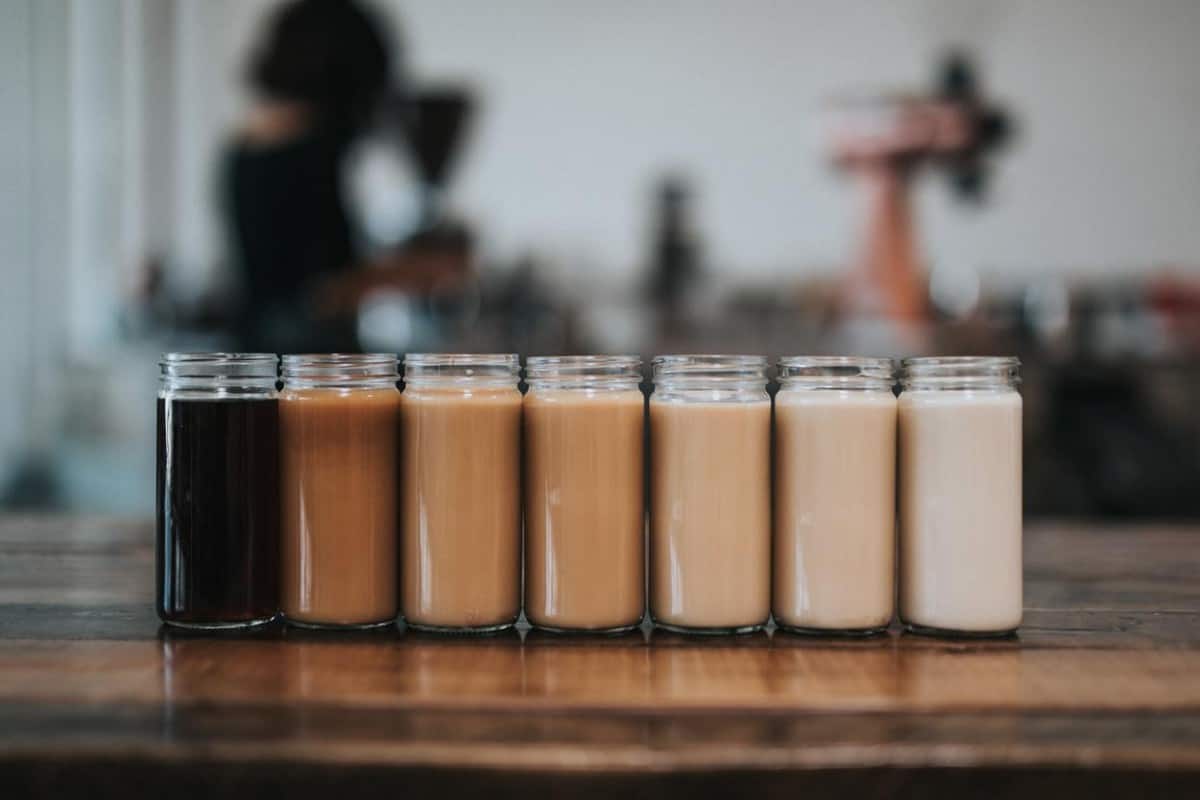Short Answer: Yes, coffee at its purest is kosher.
The natural flavor and the roasted form of coffee are considered kosher because no other food substances are added during the process.
But what about unflavored or decaffeinated ones?
Is coffee in that form considered kosher too? Well, the additives can convert coffee from kosher to non-kosher.
Flavored lattes that hold different tastes, starting from vanilla to pumpkin spice, are made with various components that might not be kosher.
As such, one could be sipping their coffee no longer belonging to a kosher state.
So, let’s explore the important details to ensure you’ll get a perfect kosher coffee!
What is Kosher?
Kosher is a term used to describe food that strictly follows the dietary standard of traditional Jewish law.
According to research, the strict Kosher dietary plan allows distinctiveness on rules of what one can include in their meals and what should be avoided, as set by the sacred texts of the Jewish book.
However, there are differences in maintaining strict kosher guidelines between many. For those who look for inclusive kosher food, the combinations are strictly supported.
Do Coffee Beans Have To Be Kosher?
Decaffeinated coffee is considered an ideal form of kosher coffee. Through such a process, 98% of caffeine is removed. Following the methods of decaffeinated coffee will make one stick to their kosher habits.
Coffee is inherently kosher. However, there are coffee companies selling coffee with other food ingredients that are not kosher.
Decaffeination is when coffee beans are rinsed, followed by heating them in the solvent, which successfully removes the caffeine.
Check out the video to know more!
The methods of decaffeination are:
- dissolving the coffee in methylene chloride
- using the European water process by rinsing the coffee with water and methylene chloride
- the process where activated carbon filters and water remove caffeine (Swiss water method)
- the ethyl acetate and the CO2 process involving this method is called the natural process
Is Starbucks Coffee Kosher?

Starbucks coffee, unfortunately, is not kosher-friendly.
The company is not considered to serve kosher coffee because the handcrafted beverages, the food items which are taken to prepare coffee, are not filtered and prepared under proper supervision.
Starbucks, however, did run a program called star-K to practice the testing of kosher-friendly equipment. With the loss of supervision, the company no longer imposes the Star-K program.
Is Nescafe Kosher?

In the case of inclusivity, Nescafe has also made its way to being 100% kosher-friendly.
Nescafé is a favorite instant coffee for most coffee lovers. The easy-to-prepare and delicious instant coffee has always been in question of being kosher-friendly.
Nescafe is authentic with its Brazilian extracts.
This goes to say, Nescafe can definitely be a staple for anyone looking for an instant kosher coffee!
Is Black Coffee Kosher?
Black coffee is indeed kosher!
The ingredients of black coffee are simple – coffee and sugar are kosher-friendly.
Looking for black coffee that is kosher in a convenience store or a restaurant may not be easy. Since there are some rules for the utensils to be kosher, it may be applicable when drinking black coffee from a non-kosher utensil.
Also, do not forget to check out the fancy version known as Long Black coffee!
Is Sugar Kosher?
Sugar is perfectly kosher as much as any other kosher food substance.
Refining sugar can be the most straightforward way to ensure that it is processed as 100% kosher. Most often, a problem arises when wheat starch is used in confectionary sugar powder.
Although the amount of wheat starch may be very insignificant, it is usually recommended not to consume such sugar during Passover.
So, it is best to purchase reliable Passover-certified sugar to avoid mishaps.
Is Coffee With Milk Kosher?
Dairy from animals that are healthy and clean is considered kosher.
On the other hand, if it’s found that an animal was, in fact, a diseased one after slaughter, then milk taken from the animal is considered non-kosher.
Thus, many would question if coffee with milk goes under the category of being kosher. The very concern about dairy products and coffee arises because of specific health policies maintained in the kashrut culture.
However, it cannot be determined clearly as the source of the dairy; many of the regulations with dairy being kosher are overruled.
So, cow’s milk is generally considered to be kosher.
The only reason for so much talk about kosher regulations is to understand why something is taken as kosher or non-kosher.
Nevertheless, coffee with all three elements, including water, milk, and coffee beans, is considered kosher.
Is Coffee Naturally Kosher?
Yes, coffee is generally considered to be naturally kosher. Coffee is made from coffee beans, which are not derived from any non-kosher animals or prohibited plant species.
Therefore, coffee is generally considered to be a kosher food item.
However, it’s important to note that coffee may come into contact with non-kosher ingredients or equipment during the manufacturing process, such as during the roasting, grinding, or packaging stages.
Coffee itself is generally considered to be naturally kosher, but it’s important to ensure that the coffee you purchase is certified as kosher to ensure that it meets strict kosher standards.
What Are the Bindings on Dairy Kosher?
All kinds of dairy products are considered to be kosher.
So there aren’t many issues consuming butter, yogurt, or milk itself. Milk is a compound of water, sugar, minerals, bacteria, and water, all of which are very natural.
However, there are few bindings as to dairy being perfectly kosher.
- Sourced from a kosher animal: for animals to be kosher, the animals should be under those who chew their cuds. Animals such as goats, sheep, deer, oxen, and gazelles are considered kosher animals. Animals that do not chew their cud, such as pigs are not considered kosher.
- Not to be mixed with derivatives: gelatin and rennet are sources of meat-based derivatives and shouldn’t be mixed with dairy. Processed cheese products are hence not kosher.
- Using kosher utensils: when processing or making any dairy-based product, the rule is to prepare it using kosher utensils. One cannot use utensils that were used before for processing meat.
Are All Coffee Kosher?
The answer varies.
The flavored coffee purchased from different sources has flavors infused in them that might not go with the suitable kosher traditions. In such cases, decaffeination is the best process to go.
Kashrut coffee is maintained to be 100% kosher. This coffee is made in such a way as to avoid any contamination by small particles or other items.

Keep in mind that purchasing coffee from different uncertified stores can have you land yourself on any non-kosher coffee version.
How to Make Kosher Coffee?
The method of making kosher coffee is just the same as any regular coffee.
When it comes to making sure the cup is 100% kosher, the focus needs to be set on the ingredients.
These are the standard ingredients for kosher coffee:
- one tablespoon of coffee granules
- boiling water (taken as per requirement)
- ½ cup kosher milk
- Three tablespoons of maple syrup or one tablespoon of sugar
And here’s the procedure:
- Mix all the ingredients in a blender.
- Blend the mix for 3 to 5 minutes. If you’re making iced coffee, add 1 to ½ cup of crushed ice.
- Add maple syrup or sugar to taste.
Here’s the typical nutrition content of kosher coffee:
| Nutrients | Amount | Value |
| Fat | 11 g | 17% |
| Sodium | 190 mg | 8% |
| Carbohydrates | 53 g | 18% |
| Cholesterol | 0 mg | 0% |
Is Coffee Jelly Kosher?
Coffee jelly does have a version of it being Kosher!
But do keep in mind it can be kosher only if the gelatin used is certified.
Gelatin made from the skin and bones of animals is perfectly consumable in kosher culture if the practice of cleanliness with the animals is maintained.
However, gelatin made from non-kosher animals is not permissible.
So it is important to make sure the gelatin that you are using should be derived from slaughtered animals going through kosher preparation and processing.
Other components of gelatin, including different additives, need to be kosher as well.
Gelatin is also made from fish skin; the same bindings are applicable when making products from any fish.
You can also check the expert analysis on gelatin for a more detailed picture.
But the real deal about gelatin is that being kosher is the source and certification labeled with it.
So make sure to carefully read the labels if you want to follow kosher-based coffee jelly.
Want to know more about coffee jelly? Then be sure to check out this post to know about coffee jelly.
Can You Use Marshmallows in Your Kosher Coffee?
Marshmallows are sourced from gelatin and under rabbinic supervision, marshmallows can be processed as kosher.
However, most marshmallows are not kosher unless they’re certified.
Even if all the ingredients that go into making marshmallows are kosher, the processing cannot be followed without appropriate rabbinic supervision.
Hence, if you feel like having marshmallows with your hot brewed kosher coffee, it is best to check the packages for proper indication.
Final Say
Kosher coffee isn’t tough to find or make and the only difference probably is the ingredients that go into making it.
And if everything fails, then worry not! Because Nescafe will always be there to rescue you!
But yes, you should definitely check the labels to make sure the coffee and the ingredients abide by the rules of being kosher-friendly.
Nonetheless, you can enjoy a really lovely hot brewed black coffee as it’s mostly coffee that comes in contact with water.
And that makes coffee at its purest kosher!
Other Articles
- Check out the visual story version of this article
- How Much Caffeine Is In Coffee? (How Much is Safe?)
- Is Coffee Keto? (In-Depth Analysis)
Click here to view the Visual Story Version of this Article.
Contents
- 1 What is Kosher?
- 2 Do Coffee Beans Have To Be Kosher?
- 3 Is Starbucks Coffee Kosher?
- 4 Is Nescafe Kosher?
- 5 Is Black Coffee Kosher?
- 6 Is Sugar Kosher?
- 7 Is Coffee With Milk Kosher?
- 8 Is Coffee Naturally Kosher?
- 9 What Are the Bindings on Dairy Kosher?
- 10 Are All Coffee Kosher?
- 11 How to Make Kosher Coffee?
- 12 Is Coffee Jelly Kosher?
- 13 Can You Use Marshmallows in Your Kosher Coffee?
- 14 Final Say
- 15 Other Articles

